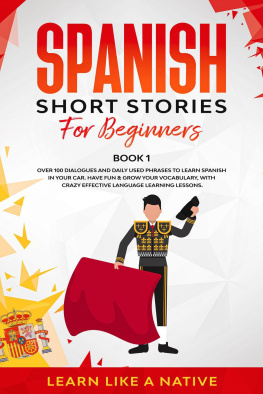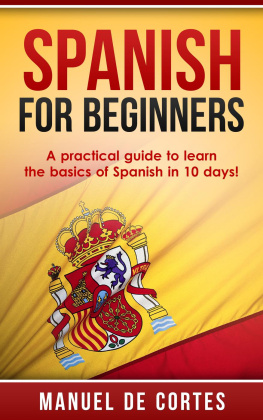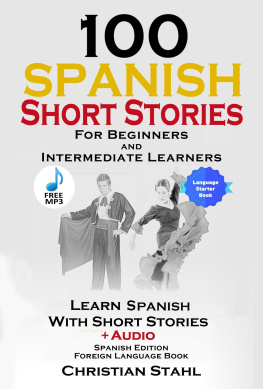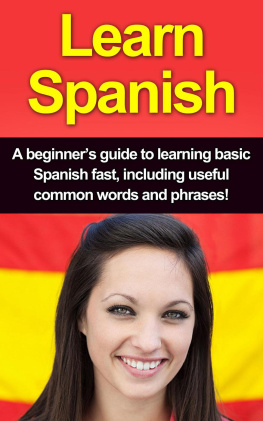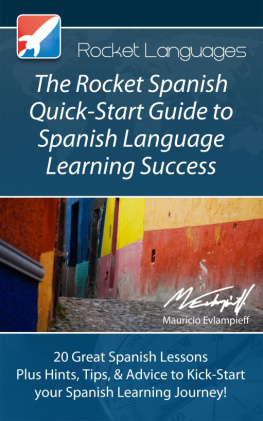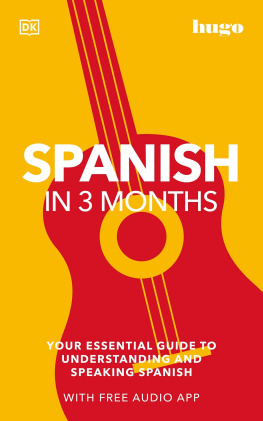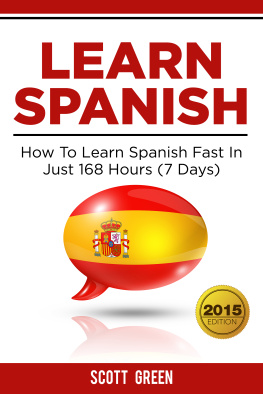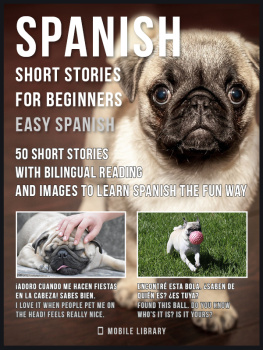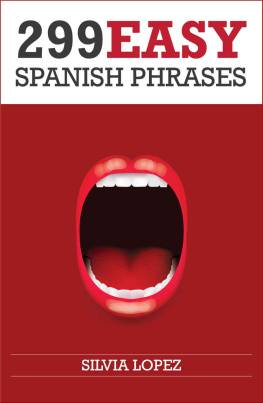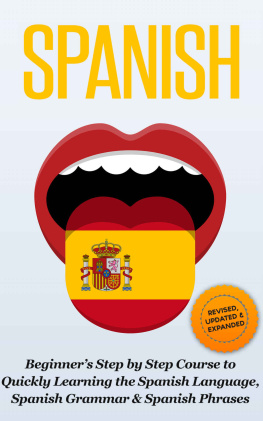SPANISH 3 BOOKS IN 1 : VOCABULARY AND GRAMMAR COMMON PHRASES SHORT STORIES THE BEST GUIDE FOR BEGINNERS TO LEARN AND SPEAK SPANISH QUICK AND EASY, ALSO IN YOUR CAR PAUL RAMOS
Copyright 2020 by Paul Ramos - All Rights Reserved
The content of this book may not reproduced, replicated or transmitted without written permission from the author or the publisher. Under no circumstances will any blaim or legal responsibility be held against the publisher or author, for any damages, reparation or monetary loss due to the information contained within this book. Legal notice : This book is copyright protected. It is only for personal use. You cannot amend, distribute, sell, use or quote any part of this book without the consent of the author or publisher.
SPANISH VOCABULARY AND GRAMMAR THE BEST GUIDE FOR BEGINNERS TO LEARN AND SPEAK SPANISH QUICK AND EASy.
HOW TO BUILD COMMON PHRASES WITH PRINCIPAL VERBS AND BASIC RULES, ALSO IN YOUR CAR. PAUL RAMOS
Copyright 2020 by Paul Ramos - All Rights Reserved The content of this book may not reproduced, replicated or transmitted without written permission from the author or the publisher. Under no circumstances will any blaim or legal responsibility be held against the publisher or author, for any damages, reparation or monetary loss due to the information contained within this book. Legal notice : This book is copyright protected. It is only for personal use.
Table of Contents
Introduction
Learning a second language is something that a lot of people want to do, and Spanish is often the favorite among second-language learners.
Table of Contents
Introduction
Learning a second language is something that a lot of people want to do, and Spanish is often the favorite among second-language learners.
It is the second most common language, and when compared to other languages like German or Japanese, it is a lot easier to learn. First off, we will go over ways to improve your retention. This tends to be something that a lot of people struggle with, but with the helpful tips, you should find your retention improving ten-fold. Then we will go into advance Spanish rules. This presents new rules that you will need to follow when speaking Spanish, as well as refreshing your memory on some of the basic rules. After that, we will look at some of the trickier pronunciations that you can be faced with in Spanish.
These will give you more complicated sentences and statements that you can use when meeting somebody because nobody wants only to be able to ask how a person is. There are a lot of nouns in Spanish, just like there are in English, and we have done our best to go over all of the nouns that you need to know, and this will also include pronouns, adjectives, and more. Luckily, once you have got the hang of how to conjugate regular verbs, you will know how to conjugate all regular verbs. Its the irregular verbs that everybody hates to learn, but dont worry; well make it simple for you. After that, we will go over commands before covering indefinite and negative statements. After that, we will go into advanced rules on how to form sentences.
We cant always talk in simple sentences like cmo ests? Next up, well learn some advanced tenses, which can be a frustrating part of learning any language. This involves learning different forms for verbs and everything. Then we will talk about the progressive tense and passive voice. The next thing we will cover is advanced question formation. Questions tend not to be that difficult, but some things can get complicated. Then, we will go over advance moods, which we will spend most of our time talking more about the subjunctive moods because this mood isnt used that much in the English language.
After that, well go over statements that are exclamatory and interrogative. Then we will wrap the book up with a glossary of terms for your study. Lastly, you will find three short stories that will provide you with the opportunity to test everything that you have learned. We hope that we have brought everything together so that you can learn the Spanish language while also having fun. There are a lot of options out there to help you with learning Spanish, but we are happy that you have chosen our book to help you out. Lets get started.
Do you have days where you dont think you are learning anything about Spanish? Do you feel like you are trudging down a road and getting absolutely nowhere? You may be having a hard time just finding time to practice and learn. With everything you do in your daily life, work, family, and housework, it is a challenge to find a couple of minutes of free time to do the things you want to do for yourself. It doesnt even matter where you are in your Spanish journey. We have some great tips to help improve your retention.
Chapter 1 - Principal and Basic Rules
Lets start from the basics. Pronunciation is something you will have to practice, because thats a key difference between English and Spanish.
In Spanish they speak as they write. This means that words are pronounced exactly as they are written. In general, every letter has only one possible sound, although there are a few exceptions that will see below. Spanish and English share the alphabet. Lets see the letters and some tips to pronounce them correctly.
| e | e | Sounds like the e in bed. |
| i | i | Sounds like i in him. |
| o | o | This letter sounds like o in song. |
| u | u | This letter sounds like u in flu. |
Consonants in Spanish are same as English but with the addition of (that can be typed on an English keyboard when pressing ALT+164)
| Letra (letter) | Nombre (name) | Consejos de pronunciacin (pronunciation tips) |
| b | be | This letter sounds like an English b. |
| c | ce | If before a, o, u sounds like the English k in kite. |
| c | ce | If before a, o, u sounds like the English k in kite. But before e or i, sounds similar to th in think. |
| d | de | Like English. |
| f | efe | Like English. |
| g | ge | Sounds like an English g when before a, o or u, and similarly to the English h when before e or i. |
| h | hache | This letter is mute in Spanish, except when follows a c that sounds like English ch. |
| k | ca | Like in English. |
| l | ele | Like in English. |
| m | eme | Like in English. |
| n | ene | Like in English. |
| ee | There is not any English correspondence but the sound is similar to ny in canyon, best example can be found in the word Espaa. |
| P | pe | Like in English. |
| q | cu | Always followed by the letter u and sounds like English k. |
| r | erre | Like in English. |
| s | ese | Like in English. |
| t | te | Like in English. |
| v | uve | Sounds like an English b. |
| w | uve doble | This letter has been imported from English to Spanish, hence sounds similar to English w. |
| x | equis | Like in English. |
| y | ye | Sounds like the y in English yes. |
| z | zeta | Sounds similar to th in think. |
Now is practice time! A practicar! Say the following words focusing in their pronunciation: Casa (house), beber (to drink), vivir (to live), gorro (hat), luna (moon), gato (cat), len (lion), jirafa (giraffe), perro (dog), zorro (fox), queso (cheese), tarta (pie), pastel (cake), hospital (hospital), carta (letter), pez (fish), silla (chair), chimenea (chimney), mesa (table), nariz (nose), hombro (shoulder), barriga (belly), vaso (glass), plato (plate), flor (flower), lpiz (pencil), papel (paper), carpeta (folder), maleta (suitcase), chaqueta (jacket), servilleta (napkin), reserva (booking), coche (car), gasolina (petrol), dinero (money), direccin (address), pulsera (bracelet), libro (book), pelcula (film), fotografa (picture), museo (museum), funda (case), rebajas (sales), grande (big), sonrer (smile), ayuda (help), encontrar (to find), buscar (to search), pan (bread) 1.2 Pronouns A pronoun is a word we use instead of a name, person or thing. Now is practice time! A practicar! Say the following words focusing in their pronunciation: Casa (house), beber (to drink), vivir (to live), gorro (hat), luna (moon), gato (cat), len (lion), jirafa (giraffe), perro (dog), zorro (fox), queso (cheese), tarta (pie), pastel (cake), hospital (hospital), carta (letter), pez (fish), silla (chair), chimenea (chimney), mesa (table), nariz (nose), hombro (shoulder), barriga (belly), vaso (glass), plato (plate), flor (flower), lpiz (pencil), papel (paper), carpeta (folder), maleta (suitcase), chaqueta (jacket), servilleta (napkin), reserva (booking), coche (car), gasolina (petrol), dinero (money), direccin (address), pulsera (bracelet), libro (book), pelcula (film), fotografa (picture), museo (museum), funda (case), rebajas (sales), grande (big), sonrer (smile), ayuda (help), encontrar (to find), buscar (to search), pan (bread) 1.2 Pronouns A pronoun is a word we use instead of a name, person or thing.
Next page

